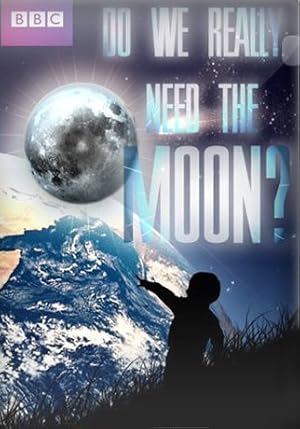
Do We Really Need the Moon? Page #6
- NOT RATED
- Year:
- 2011
- 60 min
- 138 Views
'This is a fossil coral from the Devonian era.
'but still beautifully preserved.
'As well as monthly growth bands, there are annual bands
'and even daily bands, a quarter of a millimetre apart.'
So this coral grew about a quarter of a millimetre every day 400 million years ago.
And if we took the time to count up all these daily growth bands,
within the year we'd find...
not 365 days
but in fact in this coral there are 400 bands every year.
- 400 bands?
- Per year.
- So that means that there were an extra 35 days every year?
- That's right.
That's quite mind-boggling.
'If there were really 400 days in the year back then, how long was each day?'
If you do the sums, and take the total number of hours in a year
and divide by 400 days, then you come to the conclusion
that in the Devonian period, when this fossil was alive,
a day actually lasted 21 hours and 55 minutes.
Now I must admit I find that really weird.
The fact that in the past, a day wasn't 24 hours.
The length of a day is simply the time it takes for the Earth to spin once
and go from one sunrise to the next.
If, in the past, days were shorter,
then the Earth must have been spinning faster.
In fact, back in time, back billions of years,
the planet was spinning so fast
that each day lasted just five hours.
But why should the spin of the Earth have changed over time?
Because of the Moon.
When the Moon formed, it was so close to the Earth,
and pulling so hard that it acted as a brake on our planet.
The gravitational pull of the Moon was slowing the Earth's spin
As the Earth spins,
the effect of friction between the ocean bulge and ocean floor
causes the Earth's spin to slow down.
It means days have been getting longer.
What was once was five hours now lasts 24.
We humans have been around for such a short time,
about 200,000 years,
that we've only ever known 24 hour days.
Our body clocks are completely geared for that length of day.
And yet, we only have 24-hour days because of the Moon.
It's amazing to think that the very rhythms of our planet
have been set by this ball of rock out in space.
But what about the Moon itself?
How has it been affected by the spin of the Earth?
One of the first things you learn in physics is that for every action
there is an equal and opposite reaction.
As the Earth has been slowing down all these years,
something else has been accelerating,
and that's the Moon.
And to compensate for its acceleration,
something's been happening to its orbit at the same time.
Imagine the centre of this roundabout is the Earth, and I'm the Moon in orbit.
Translation
Translate and read this script in other languages:
Select another language:
- - Select -
- 简体中文 (Chinese - Simplified)
- 繁體中文 (Chinese - Traditional)
- Español (Spanish)
- Esperanto (Esperanto)
- 日本語 (Japanese)
- Português (Portuguese)
- Deutsch (German)
- العربية (Arabic)
- Français (French)
- Русский (Russian)
- ಕನ್ನಡ (Kannada)
- 한국어 (Korean)
- עברית (Hebrew)
- Gaeilge (Irish)
- Українська (Ukrainian)
- اردو (Urdu)
- Magyar (Hungarian)
- मानक हिन्दी (Hindi)
- Indonesia (Indonesian)
- Italiano (Italian)
- தமிழ் (Tamil)
- Türkçe (Turkish)
- తెలుగు (Telugu)
- ภาษาไทย (Thai)
- Tiếng Việt (Vietnamese)
- Čeština (Czech)
- Polski (Polish)
- Bahasa Indonesia (Indonesian)
- Românește (Romanian)
- Nederlands (Dutch)
- Ελληνικά (Greek)
- Latinum (Latin)
- Svenska (Swedish)
- Dansk (Danish)
- Suomi (Finnish)
- فارسی (Persian)
- ייִדיש (Yiddish)
- հայերեն (Armenian)
- Norsk (Norwegian)
- English (English)
Citation
Use the citation below to add this screenplay to your bibliography:
Style:MLAChicagoAPA
"Do We Really Need the Moon?" Scripts.com. STANDS4 LLC, 2024. Web. 31 May 2024. <https://www.scripts.com/script/do_we_really_need_the_moon_7028>.


Discuss this script with the community:
Report Comment
We're doing our best to make sure our content is useful, accurate and safe.
If by any chance you spot an inappropriate comment while navigating through our website please use this form to let us know, and we'll take care of it shortly.
Attachment
You need to be logged in to favorite.
Log In